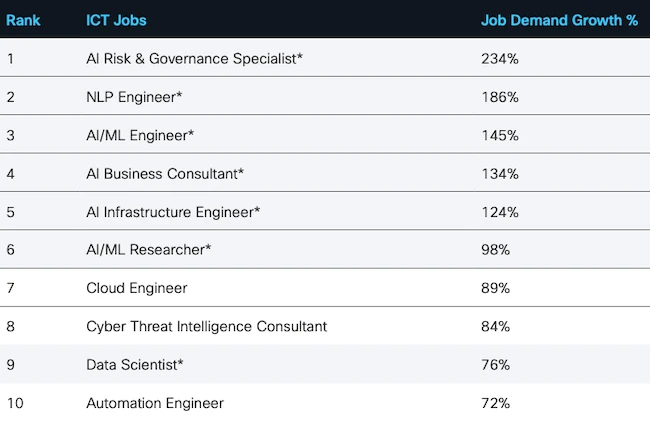Top 10 fastest growing ICT jobs
AI is reshaping the workforce in ways that security leaders cannot ignore. The AI Workforce Consortium’s new report, ICT in Motion: The Next Wave of AI Integration, provides a look at how AI is changing job roles and skills across G7 economies. The findings point to risks and opportunities in building teams that can handle the security, ethics, and governance challenges of AI adoption.

Top 10 fastest growing ICT jobs (G7 country aggregate) (Source: Cisco)
AI skills integration transforms job functions
The Consortium, which includes Cisco and other major technology companies, looked at 50 job roles across ICT and support functions. They found that AI is no longer limited to a few specialists. It is becoming a basic skill needed across the workforce. From software development and data science to cybersecurity, infrastructure, and management, AI skills integration is redefining job functions, workflows, and expectations.
This shift is driven by the adoption of AI tools, automation platforms, and intelligent agents that demand new technical proficiency. Many of the fastest-growing jobs are now centered on AI, such as AI/ML Engineer, NLP Engineer, and AI Risk and Governance Specialist.
The acceleration of agentic AI systems, capable of independent decision-making, is one reason for this shift. These tools are driving new security and compliance requirements. Organizations are finding that without staff who understand AI security and governance, they cannot deploy these systems at scale.
Security skills under pressure
Research shows that demand for AI technical skills is now integrated into 50 job roles across all career levels, contributing to a skills deficit throughout G7 economies.
The market does not yet supply enough professionals with these capabilities. LLMs, LLM Architecture, Prompt Engineering, Conversational AI, and Generative AI are identified to have the highest demand growth rate among AI skills and required immediate skills learning interventions to cater to job market demand.
The demand for AI Governance and AI Ethics skills are growing exponentially, further widening the gap between the supply of qualified professionals and the needs of employers. These shortages directly affect an organization’s ability to secure AI systems against misuse and align them with regulatory expectations.
In-demand human skills
The report also reinforces that technical training alone will not solve the problem. Human skills are increasing in importance. Communication, critical thinking, and leadership are in higher demand across ICT roles. For security teams, this translates into a need for staff who can explain AI risks to business leaders, collaborate across functions, and apply ethical reasoning in complex scenarios.
AI adoption is not only about technical defense. It is also about trust. Workers who can combine technical security knowledge with human-centric skills will be best positioned to manage AI responsibly.
“As AI reshapes our world and work, people remain at the center,” said Francine Katsoudas, Chief People, Policy & Purpose Officer, Cisco. “This year’s report shows that AI skills open exciting new doors, but it’s the combination of technical expertise and human strengths like collaboration and leadership that will truly shape a brighter future. We are committed to building a workforce that is ready for this new era of growth, and to give people everywhere the opportunity to learn, contribute and benefit.”
Hotspots for AI skills
The strongest AI job growth is happening in established tech hubs such as Silicon Valley, London, and Toronto. Emerging centers like Manchester, Lyon, and Vancouver are also gaining ground. This regional clustering shapes where talent is most available and where competition for AI security professionals will be most intense.
Understanding these labor market dynamics can help security leaders decide where to focus hiring efforts, partnerships, and training programs.
Leading the security response
The Consortium calls for businesses to take a skills-first approach. For security leaders, this means investing in AI-focused learning and development. Teams need structured training in AI risk, governance, and technical defense, along with career pathways that connect early exposure to AI tools with advanced governance roles.
The report suggests using frameworks like “Build, Buy, Borrow, Bot” to align workforce strategies with business needs. Applied to security, this can mean developing some skills internally, hiring for others, building partnerships to fill gaps, and using automation for routine monitoring tasks.